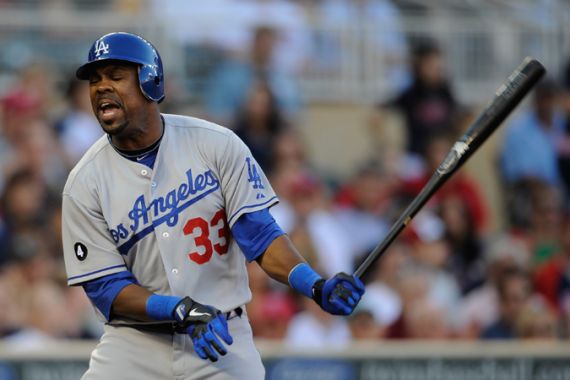Dodgers’ bankruptcy reveals much about the US
The Dodgers team has a long, iconic history in America – making it hard for fans to accept the fact they are bankrupt.

 |
| The Dodgers have a long history in the US, starting as the “franchise of the immigrants” in Brooklyn before moving West to Los Angeles [GALLO/GETTY] |
Much has been written about the Los Angeles Dodgers’ declaration of bankruptcy.
Much has been said about the business practices of Dodgers owner Frank McCourt and his battle against the efforts of Major League Baseball commissioner Bud Selig to forcibly seize the team. But what does an insolvent Dodgers franchise say about the state of America in the 21st century?
Maybe it says nothing at all. Maybe it’s as simple as saying that Frank McCourt mismanaged the team. Yes it’s true that McCourt looks terribly incompetent and used the team as a personal ATM to live a lifestyle that would shame Caligula.
But that doesn’t explain the broader economic crisis in the sport. It doesn’t explain why the Texas Rangers in 2010, on the road to the World Series, had to be auctioned off at a bankruptcy sale. It doesn’t explain why the New York Mets, playing in the game’s biggest market, are flat broke after team owners Fred Wilpon and Saul Katz thought Bernie Madoff would make a fine personal investment banker. It doesn’t explain why Selig, when he crows about baseball’s rosy financial picture, sounds like he’s living in the last days of disco.
But more than anything else, it doesn’t explain how – of all teams – the Los Angeles Dodgers find themselves in this crucible of humiliation. The Dodgers are arguably the most culturally significant franchise in the history of American sports. It’s the team of Jackie Robinson, Sandy Koufax, Fernando Valenzuela, and Hideo Nomo.
That’s more than just a tradition. That’s a Ken Burns epic.
From their days in Brooklyn, the Dodgers were the franchise of the immigrants, the strivers, the ones who thought the American Dream was there for those willing to scratch and bleed for it. They were able to maintain this persona even when they broke Brooklyn’s heart and absconded for the Left Coast.
There, they entered the hearts and homes of the Chicanos, Dominicans, and Asians that make up Southern California. Going to Chavez Ravine in the 1970s and 1980s was like going to a diverse people’s assembly that would shame the United Nations.
They have always been baseball as baseball wants to be known: a melting pot that speaks to our best angels. Unlike the Yankees who simply won with remorseless efficiency, the Dodgers were interested in building a more perfect union.
Symptomatic of a bigger problem
Precisely because this team has always lived at the heart of the national Zeitgest, their bankruptcy should be seen as a brutal microcosm of the leveraged capital and dashed dreams that define the new century. As Harold Meyerson wrote in the Washington Post newspaper, the Dodgers now represent: “a particularly vicious form of capitalism that America has come to know too well the past few decades: a new owner takes over a venerable firm and extracts what he can for himself, decimating the company and damaging the community in the process.”
In as public a way as possible, the Dodgers have become the canary in the coalmine revealing a reality we often turn to sports to escape.
American author Alison Lurie once wrote, “as one went to Europe to see the living past, so one must visit Southern California to observe the future.”
That future is now the site of income inequality on par with the Ivory Coast, Jamaica and Malaysia. It’s a place of fake riches and real pain. Official unemployment sits at a doctored 12 per cent with youth unemployment at 35 per cent. All of these numbers should be taken about as seriously as a Goldman Sachs balance sheet.
In such an environment, the team that was always supposed to represent the spirit of immigrant America now has a shrinking base of support.
After a brutal beating in the stadium parking lot on Opening Day, security is now run by the LAPD. They shadow every corner of the landscape, making the Elysian Fields feel like occupied territory. Instead of Dodgers Stadium being the place where you take your kids on your day off, it’s the place you either avoid or hope to find a job.
Perhaps the most emblematic moment of this entire saga has been seeing on the team’s list of creditors, the name of Vin Scully.
The 83 year old Scully has been the team’s announcer for 62 years. Starting in Brooklyn and making his way with the team across the country, he brought the exploits of immortals like Roy Campanella, Don Drysdale, and Orel Hershiser to life.
Now he’s just another person the Dodgers went to court so they wouldn’t have to pay. Now he’s another senior citizen wondering how a California dream could become so scarred. What does the Dodgers bankruptcy say about America?
Everything.
Dave Zirin is the author of “Bad Sports: How Owners are Ruining the Games we Love” (Scibner) and just made the new documentary “Not Just a Game.” Receive his column every week by emailing dave@edgeofsports.com. See all of his work at edgeofsports.com.
The views expressed in this article are the author’s own and do not necessarily represent Al Jazeera’s editorial policy.
